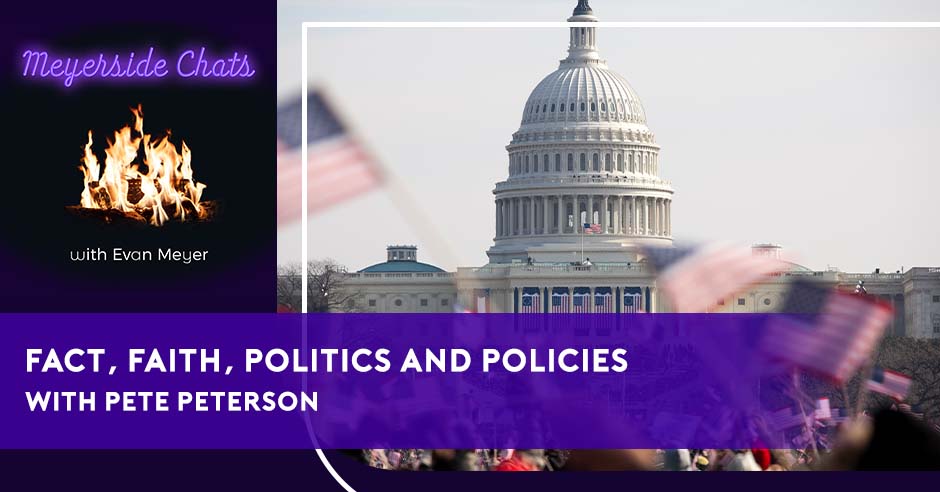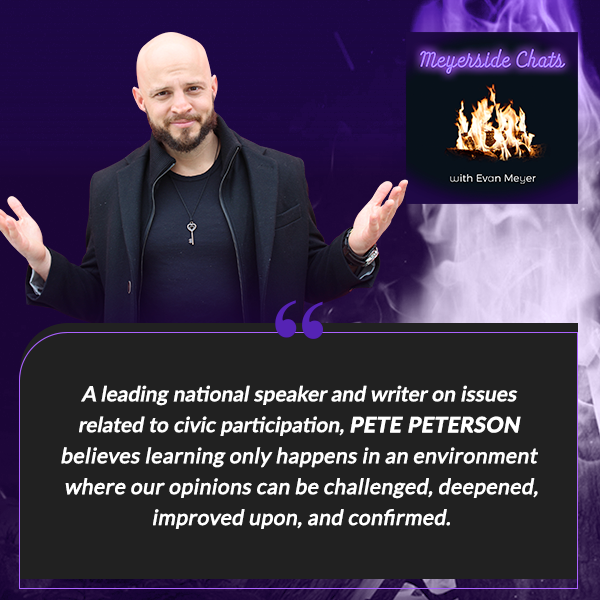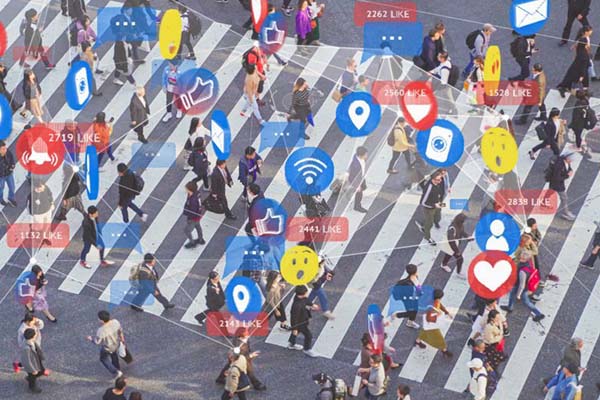
There is no hotter topic than politics. And with the midterm elections coming up, Evan Meyer chats with Pete Peterson to talk about what politics looks like and discusses important topics, including perceived threats from overseas, the COVID pandemic, and social issues that continue to drive US politics and policies. They also share their insights on how truth has become subjective and how disagreements can be resolved through humility, especially on issues where we hold different positions. Tune in as they recall lessons learned, or failures thereof, from previous generations and how historical awareness influences how we handle the crisis we face today.
—
Listen to the podcast here
Fact, Faith, Politics And Policies With Pete Peterson
Pete Peterson, the man, the myth, the legend. Good to see you.
Good to see you too. Greetings from Pepperdine.
How is Pepperdine?
It’s another beautiful day here on campus. We are off and running in our fall semester into week four. It’s great to see students back on campus, events, classes, and other things going on. It’s a great time to be here in Malibu.
Is Pepperdine experiencing any of this election season stuff going on? How is Pepperdine faring with all that?

Particularly, here at the graduate policy school, we’ve actually hosted a couple of events already in 2022 that highlighted and focused on issues pertaining to the elections. We partnered with the US Election Assistance Commission, which is a Federal commission of presidential appointees from both the Democrat and Republican parties that are essentially tasked with supporting election administrators around the country.
We hosted a conference about election administration here, and then it was a constitution day week. We partnered with the national conference on citizenship, looking not only at voting but other ways that people are getting involved civically, particularly through volunteering. We highlighted a couple of Los Angeles-based nonprofits that are doing some great work on education and homelessness.
Given that we are in the election season, all the stuff starts to come up about everyone, and everything becomes top of mind, from issues to politicians. Something I love to hear is your thoughts on the problem with politics in 2022.
If I were to frame it in one phrase, it’s fear of the future. That is being seen on both the left and right and perceived in different ways but the throughline between the two is a fear of what’s coming or what might come. On the left, there is a fear of a continuation of the violence that we saw on January 6th, 2022, and there’s a general antipathy towards former President Trump. Even though he obviously won’t be on the ballot, he has inserted himself in a variety of races. It is being used as a foil in some ways by the Democratic Party to turn out the vote on that side.
On the right, there’s a fear of what might be called a growing Woke Movement on the left, which is being seen in school districts and businesses in other places. You saw that at play in the Virginia gubernatorial race in 2021, in which many of these issues around education. The COVID lockdowns were very much on the ballot. It did, even in a purple-ish blue state like Virginia, generated enough turnout to put a Republican candidate and now Governor Youngkin into the governor’s mansion.
We’ve got fear of Trump on the left and fear over Woke-ism on the right. Is this all playing into local politics?
It is. To touch base on one of the real tectonic plate shifting events in American politics in the last few years was COVID. What COVID did in many ways, and I have raised this as a point of comparison, is someone who got very engaged and frankly aware politically in the wake of 9/11. 9/11 was a national crisis that shifted the focus of Americans on issues that were both Federal and global.
We remember this term, the Global War on Terror, and the creation of Federal agencies, the intelligence apparatus, and so forth, much of the discussion around policy and politics were much more at that level. What COVID has done is shift the focus in some ways that are mirrored but also different. As Americans have come to understand that we don’t just live in a country and even live in States. We live in counties and municipalities because of what we saw in the policy and political responses to COVID.
[bctt tweet=”As Americans, we have come to understand that we don’t just live in a country or in states. We live in counties and municipalities because of what we saw in the policy and political responses to COVID. ” via=”no”]
In some cases, we continue to see our differences in how different counties react to it, even here in California, and how different states are reacting to the COVID response. In that, there is a greater emphasis on what’s happening at the local level. The Dobbs decision in the Supreme Court regarding the overturning of Roe v. Wade has taken what a Federal policy around abortion was. It has now shifted the attention to states. We’ve already seen in a couple of states like Kansas, where measures have been proposed either as ballot measures or state legislative pieces, that the attention is now being focused at the state and more local level. With that, there’s an increasing politicization that’s coming down to the more local level as well.
How do you feel that these candidates that are running are going to begin to incorporate that into some of their messaging? Do you feel that they are going to run on some of the values at the Federal level, these policies, issues, group politics, and identity politics even in a lot of ways?
It’s fair to say that there has been a populist movement on both the left and right that is fundamentally changing the opinions and set of policy priorities of both a part of Democrats and Republicans. Of course, we have seen that most dramatically in the presidency of former President Trump and his impact on the party and particularly a certain set of issues, have begun to dominate the Republican Party in ways that have changed significantly.
I will point to two but it’s worth showing how things have shifted. Number one, immigration. It’s very easy to go back 10 or 15 years and find clips from Republican candidates saying that we want more immigration, we are a very pro-immigration party, we definitely want to welcome people to get involved in our businesses, and so on.
At the same time, you can go back a dozen years to the clips you can find on YouTube, from current President Biden as a Democrat arguing against opening immigration policy. That focus, at that time, for the Democrats was on protecting union lower and lower-middle-class jobs that were seen to be at stake with higher unskilled immigration coming into the United States. You’ve seen a real sea change on that issue as to how Democrats and Republicans are viewing that.
The second issue is around free trade. What’s called free trade and understood free trade has always been a mantra for Republicans. In many ways, because under President Trump, the Republicans began to tie what they viewed as national security issues to trade issues in particular in response to the growing perceived threat from China that you saw Republicans talking for the first time about tariffs, which of course has never been a part of the Republican mindset for decades. Even this broader understanding, which goes back to the fall of the Berlin Wall, was the feeling of Republicans that we need to trade people for freedom.
That has been the approach toward China, which has gone through both administrations in many ways but under President Trump, that has changed. Again, the parties themselves are going through an identity crisis. You are seeing Democrats now being very much pro-immigration in ways they weren’t many few years ago and, in some ways, becoming more highly ideological.
This is the case on issues of sexual identity to take one-piece questions that weren’t even raised a few years ago around sex education. The trans movement has now become essentially understood parts of the Democratic Party platform. Again, the identity of the parties themselves is leading to a change in the candidates and the messages that are running.

Why do you think that they are taking such strong positions as a party on things like gender identity and everything that comes with that decision that could be made by youth without parent approval and stuff like that?
In two sentences, one is that it extends the logical conclusion of a certain view. This can be seen on the right as well but this is the manifestation on the left of what I would call radical individualism, which is to say that if you believe that government shouldn’t be in the bedroom, so to speak, that was the big phrase as we thought back a couple of decades ago. That is a sense morphed into, “I can assume my own identity, and I don’t need the government telling me who I am.” Not only that, it needs to be protected and celebrated, then we would believe that we would move to a place where there don’t appear to be boundaries on what’s generally or at least traditionally, been accepted in the area of sexual identity.
To me, in some ways, that’s a natural playout. In the other sense, there is grown. I heard an interview on the history of the group, the Human Rights Campaign, which was very much a part of the gay rights movement. I would argue an important part of that. After Obergefell and gay rights and gay marriage were essentially placed into policy and law by the Obergefell ruling, it wasn’t as if groups like the human rights campaign necessarily said, “I guess we are done. We’ve accomplished our goal.”
What happened was there was a move toward another category, which in this case was the transgender movement. You do have around these issues very well run and capable experienced political movement organizers, well funded that have now moved around the transgender movement in ways that are continuing to drive our politics and policy.
To talk about the other side. I suppose one of the arguments that you mentioned gay rights, for example, and religion has always been strict reading of the Bible or however you interpret the Bible could make you feel a certain way around how gay rights should be supported or not supported. At the same time, we have this separation of church and state that we are supposed to have.
Where do you see the conflict there? Is there a conflict? How do you experience things like that, whether, in general, we can use gay rights as the main activator of that? Roe v. Wade is another one. Where is religion’s place in this? Is there too much religious push on this? How come that’s not mentioned if there is? What are your thoughts on that?
I would see that at two levels. One is at the constitutional level, and the second is at the personal level. The constitutional level is simply the First Amendment, which guarantees protection for religious liberty or the practice of religion while at the same time assuring that the government itself will not get into the practice of creating a state religion.
Oftentimes, people read the First Amendment to the constitution and see that as simply encouraging religious participation. It is a two-sided coin. It’s the allowing of religious practice but, at the same time, making sure the government doesn’t get directly involved in it. In that, all the cultural trend lines seem to be going in a more secularized direction.
The importance of not just principle but that constitutional reality that people of faith should be protected in the practice of their faith is going to become increasingly important. We are seeing more of these kinds of cases. The Christian nonprofit that is offering adoption services or decides not to offer adoption services to same-sex couples in religious education and religious schools that there should be protection as put forth in the constitution for these individuals and organizations. That’s at one level.

The second level is personal. Again, as we become arguably a much more secularized society, it is worth, as a person of faith myself, understanding that increasingly the positions that I might have on these issues are not grounds for my own personal predispositions and what I would wish. They are occurring within a democratic Republic in which the people are allowed to decide what they view on what is going to be celebrated or not.
In that, Christians are increasingly understanding that their views, whether it be on gay marriage or as we look now into the transgender movement, they have been increasingly or decreasingly popular positions. Again, to go back to the first principle of constitutionality, people should still be protected and allowed to hold those positions, even if they are popularly unpopular, if I can turn that phrase.
One of the things around all these issues is something I know you speak about there’s civic virtues. The most important one, I believe, to be or one that is very relatable that people can experience now is humility. Can you explain what that is?
It is, and I agree with you, Evan. It is the grounding for a political culture that not only encourages but expects debate, discussion, and persuasion to be the methods by which policy and politics are held as opposed to force. This goes back to the first of the Federalist papers in which the founders are wondering whether there could be a government established by deliberation as opposed to force.
In that, it is not simply a set of rules and regulations or the constitution and the organization of a government. It requires that people or citizens act in a particular way that can make the best use of this constitutional system to peacefully and in civil ways resolve disagreements. That essential civic virtue is humility, which is required for people that hold their perspectives on policy, whether it be gay marriage, trans rights or how we educate our kids but requires a degree of humility when engaging with someone else who may hold a very different position.
[bctt tweet=”It requires a degree of humility when engaging with someone else who may hold a very different position because if it becomes a matter of force, it goes straight down the line as being the way Americans would see resolving any disagreement. ” via=”no”]
If it does become a matter of force, then that goes straight down the line as being the way that Americans, in this case, would see resolving any disagreement. We’ve seen an increasing amount of political violence on both the left and right, certainly the right being one would argue most visible on January 6th, 2022, and the conclusion of the 2020 election. It’s my fear and the fear of others that political violence is being seen as being more acceptable because we are not entering into our policy debates in a way that is grounded in humility on both sides.
It’s funny because I know you have been talking about this for a while but there’s a term that was on Bill Maher that he mentioned called Presentism.
I saw that.
It was interesting because we had been planning on doing this around the same time. I know that’s one of the things you have been talking about for a while, and then he brings this up. I was impressed with that. It was also synchronicity to some degree, which is the idea of what people did back in the day based on your beliefs of now, as if the circumstances and the way that we think and look at things are all the same and your values are exactly the same, and you can’t do that. That’s presentism.
That pretty much aligns with what I’ve even heard you speak about now but in previous lectures as well around humility, knowing that we would have been very different people 500 years ago. We have to respect that people are always trying to do the best they can, which is philosophically a point of a lot of philosophers to make. We are all trying to do the best under our set of circumstances we can.
That’s right, Evan. To take the conversation around humility, the next step, I was arguing as to why humility is important but the next question is, “How do you get there?” One of the ways that we teach here at the policy school, and I saw that Bill Maher clip on describing the condition of presentism is, A) To come to this rather humble place where there’s nothing new under the sun, and B) To agree very much with the way that you put it.
Everybody is doing the best they can under the circumstances that they are facing. To take that view that anything before us is ipso facto corrupted because people are acting in ways or holding beliefs of a certain kind that are no longer fashionable. That also then should open the window to how are people 50 or 100 years from now going to be looking back on the beliefs that we hold.
[bctt tweet=”People are acting in ways or holding beliefs of a certain kind that are no longer fashionable.” via=”no”]
That being said, I would argue that there are timeless principles that many of the arguments around the founding of human nature and the importance of limited government as a way of promoting community building and civic ownership. Those are timeless arguments that, for many of the founders, went back to Athens and Rome.
There are very contemporary issues but even something like COVID, the historian Niall Ferguson, who’s up at the Hoover Institution and also teaches at Harvard, wrote a book called Doom, a very upbeat title. It was the history of pandemics. Even as we think about COVID-19, it isn’t such a scientific issue, and nobody has ever dealt with this before. Humanity has been dealing with pandemics since ancient times, and there are actually lessons that we can learn.
This is the point of Ferguson’s book that we took some steps in our response, the broader response of countries, particularly the United States, to COVID that demonstrated that we didn’t learn what happened in the 1959 pandemic. Frankly, I didn’t know a lot about it before reading the book but that was a major pandemic in the United States, not to mention the smallpox outbreak back in 1918 and 1919. That presentism can become a way of saying that we are at the end of history here ourselves while not learning from history, which is, of course, one of its most valuable purposes.
You actually talk about a term for this called Applied History. A heuristic or a way of thinking about history that is part of history and political philosophy. Can you explain a little bit about that?
It’s a big part of our graduate policy program here. I mentioned before Niall Ferguson. He has been a very big proponent of this, which is a view of history as not looking back at a certain time or place and seeing what had happened then but what are the lessons that we can apply now from those instances? This book, Doom, is one of those instances where even on something like a pandemic response.
There was a lot there that we could have learned from previous generations and their battles against it, even with the scientific knowledge being much different or the public health apparatus being generally less equipped. There were still some lessons there, which if our scientists, as an expert as they may be in virology, appeared to display a real lack of historical awareness of the ways that other generations have responded to and learned from pandemics.

Why do you think that is? We could say that it was neglected. Let’s go if it was unintentional or some of it was intentional. Why do you think they are not doing that if saving the world is the most important thing?
There’s a funny, may not be funny to some in my world but there is a mantra that’s applied sometimes to people going on for advanced degrees, which is the process of knowing more and more about less and less. That view is where science becomes scientism. Scientism is a view of science that becomes very hyper-focused on a particular lens through which to understand or analyze a particular issue.
One of the challenges that we saw in our broader response to COVID is that not only did we have this hyper-virological, if that’s a word, focus on stopping the pandemic. We did that at the exclusion of other public health interests, for example, psychological. The whole field of psychology, for months, was telling those who would listen that these shutdowns and lockdowns were going to have an adverse effect on mental health.
Of course, that was seen as being secondary to stopping the virus and the spread of the virus. It’s one thing to prioritize and say, “This is more important than increased levels of loneliness, depression, addiction, and so forth.” It’s another thing to go where I think we went, unfortunately, which is to dismiss out of hand any other consideration within even the public health discussion about what was important.
I raised that to say that this was happening within public health to introduce an entirely different discipline like history and say, “It’s not what you are seeing through the microscope, folks. We can use another discipline here, in this case, history, to understand and at least get a better sense of how other generations have responded to these issues.” Obviously, Professor Ferguson’s main reason for writing the book was to say that even in things that seem to be highly scientific, the importance of understanding and applying history should be part of the way that we understand the policy and even public health challenges.
Also, people confuse science with fact. Science is not equal to fact. Science is a process of the best we have to come to objective truths, and not necessarily even absolute truths. Even Newton’s Laws didn’t work for a long time, and then Einstein came along and made some modifications and realized, “Under these circumstances, things now work like this.” It is interesting that people use science, as if science says so, then that’s true. Now, it is the best thing we often have, science does ultimately reveal these things. The average lifespan is twice what it was. To me, that’s because of medicine. People were breathing in burnt plastic, working late, and eating the worst foods possible.
Somehow, that was 100 years ago, and in some places, they are still doing it, and the average lifespan doubled. Science, for sure, has its place. If every single thing that comes out of a peer-reviewed study equals fact, it means its objective truth under these circumstances with these experiments, and this is the data we’ve collected. There are a million confounding variables often in times. I don’t know if society understands that. I would even ask people and love to ask you as well. I don’t think people you are even speaking in the same lexicon often.
They don’t have the same definitions of the word fact. I ask everyone, “What’s a fact? Tell me what a fact is,” because everyone says, “These are the facts. It’s a fact that Trump did this thing. It’s a fact Biden did this thing.” “What are you choosing to make a fact versus having faith that what the people are telling you and where they got their information from is true?”
It’s ultimately, even people who don’t have faith in religion still take faith seriously in their life. This is one of those things where I’m always so confused. I will ask two questions. 1) Why do you think that is? 2) What is your experience with people speaking about facts? What is your definition of a word fact? Start with the first one, then come back.
I didn’t come into this conversation thinking about this but it strikes me that if we take as given that America and much of the Western world are becoming increasingly secularized. As a point of comparison, much of Africa and Latin America are not. It is becoming increasingly more religiously devout but to say, the West. As we become more secularized, I believe that there’s a natural human desire for a passion for the truth.
That’s one of the things that sets us apart as unique creatures on the planet. In that, if we become more and more secularized, meaning that we don’t hold a certain metaphysical view of the truth, we will increasingly place and prioritize what might be called material truths, ones that we believe we can hold onto and argue for.
[bctt tweet=”If we become more and more secularized, we will increasingly prioritize material truths – ones we believe we can hold onto and argue for. ” via=”no”]
I do think that might be part of the issue that we are having now around the quest for truth. There’s a desire for it but what had always been held in this metaphysical foundation is that we agree that there is a truth. As that gets wiped away, that desire on the part of us as human beings focuses on, “What are the things that I can hold onto that I can know or truth.” That’s one reason.
The other reason is that from a philosophical perspective, ever since the enlightenment, in some ways, there has been a move toward the withering attack on a concept known as the truth. It began with attacks on religion. Some of those are very valid, by the way, given the way religion was being practiced in certain places and times.
It is morphed into a broader questioning of whether there is something that could even be called the truth or not. Once that takes hold of a society, and there either isn’t truth or another phrase that I know you, and I often hear, “That’s your truth.” You have your truth, and I have my truth. If those two truths come into conflict, if you say your truth is the sky is blue, and I say the sky is green, that’s your truth.
Truth is actually subjective.
It becomes completely subjective, which, of course, is antithetical to the understanding of what truth is.
We can’t even use the word truth because you are describing how you feel.
Truth has become synonymous with feelings, which are nonetheless very important. If they become the definition of truth, then we find ourselves in this place where there’s this increasing focus and emphasis on facts and arguing for a set of facts. In that, I believe as we get back to that question of human nature that, we desire truth. We seek it, whether we seek it in some metaphysical pursuit or without that in some material pursuit that is going to be the grounding for our behavior.
At this point, truth is subjective.
If it exists at all.
We then have the word fact. Tell me your definition of a fact.
I would hold those two things synonymous. I think that truth and fact, the fact is a representation of the truth held in a particular context. When I talk about this search for truth, the focus on facts and a view of the importance of facts are part and parceled around this broader search for truth.
[bctt tweet=”Fact is a representation of the truth held in a particular context.” via=”no”]
Having these conversations, trying to have civil discourse, and watching how polarized and how people terrorize each other, they name call. They say horrible things about people who have the same values and aspirations as them. I know that 99.9% of the people in this country want safe streets, good education for their kids, and help for the homeless.
Some people see things from either side, and a lot of times it is. The reason I suppose I even harp on the words is that if people aren’t even speaking the same language, how can they even communicate effectively? I feel that when people say, “It’s a fact,” if you don’t understand what that means or, “This is the truth,” that’s one of the rudimentary issues with even the conversation. I’m wondering. Without telling everyone to go look in the dictionary or coming up with a set of terms we can use, how do we get people to start having this humility to start treating people like people and see that their people like them and have kids?
I offer two things. It’s a book that we use here at the policy school. Of course, we are a graduate policy school, so all our students are going into policy or politics in some way, shape or form. One of the texts that we use is Jonathan Haidt’s book, The Righteous Mind. Haidt is a social psychologist at NYU, a self-described atheist Jew, center left but began research into why these crazy conservatives could look at the same policy issue as a progressive and come up with a diametrically opposed opinion about it.
That quest is working as a consultant to Democratic political campaigns led him into a discussion around what he calls the Five Moral Foundations. These five moral foundations, he argues, have been at the core of every human civilization in the history of the world. They range from a focus or passion for caring and fairness all the way to holding something sacred within a culture.
It may not even be religious but holding something sacred. What he found in doing the other research was once he came up with these five moral foundations and created moral quandaries around each one of these moral foundations, that self-described conservatives and progressives would respond in much different ways.
Even with the same exact prompt, when given the chance to hear a moral challenge, they would respond much differently. What has helped me to understand as somebody more on the right is that it is very possible to look at the same set of circumstances and come to a very different point of view. One of the things that are so important about that perspective is that it allows me when engaging in a conversation with somebody who sees the world politically, to get to that point of humility to understand, “I might not be seeing this completely.”

Unfortunately, as you say, we’ve stopped short of getting to that deeper level of conversation because once I know how you vote, the car you drive or the area where you live, then I know all I need to know about you, and I can write you off. It’s going to take first being aware that it’s possible for people of good intentions, high IQ people, to look at the same situation and come away with very different solutions. It’s important that we start with that.
The second piece I’ve found, and you touched on this when you said there are things that we all agree on. The next generation, our kids, and safe streets and those things. We have an Institute here called the Davenport Institute, which does a lot of work consulting with local governments on how to host more inclusive and participatory public processes. We are only called in when there has been a very polarizing local issue. It could be around public safety, land use or planning construction education. We start with the question, “Why do you love this place?”
We’ve found that to be the essential grounding question before you get into, “Here’s the policy issue. How are we going to respond to it?” If we start at, “What are we going to do to reduce crime,” then all the other baggage is going to jump in. If we start at, “Why do you love Santa Monica?” As someone who lived in Santa Monica for several years, I knew why and would be happy to argue with anybody why Santa Monica was ten times better than Venice.
From the outside, you could drive from one end of Lincoln Boulevard to the next, and the outsider wouldn’t know the difference. I’m sure you and I know why it’s better. Again, that becomes a much different grounding for conversation because people do know. Whatever they feel about how we should respond to crime or homelessness, they know why they love where they live. You can find some real interesting common ground on that before you get into the policy argument. That’s the second piece. We talk a lot about why we hate the way things are but we don’t talk a lot about why we love where we live. That’s an important place to begin.
[bctt tweet=”We talk a lot about why we hate the way things are, but we don’t talk about why we love where we live.” via=”no”]
Interestingly, you say that. 1) It’s brilliant. 2) When I was a Chair of the Ocean Park Neighborhood Association here, one of the things that I did when I started my term had everyone go around for five minutes and set the intention about what their favorite restaurant or their favorite thing to do in Santa Monica or something about Santa Monica that they held dear. They can share that.
You start seeing people like, “I love that place. That is perfect.” It only takes a few minutes because you can’t take the whole meeting up for that. The reason people get together is to improve things continually, and that comes with talking about problems. If you start with that, I found that it set such a nice tone. It was great. People felt not only that but they start to connect.
There’s a feeling of comradery. The second that you hear someone has this and you are building a connection to each person who goes around. I not only aligned with that. It’s beautiful. I wish we could instill that in every conversation before people start talking politics at council meetings. It’s like, “Five minutes, we are opening with good things that we have.”
It does reorient a public conversation, which is why when we get a chance to consult with cities, we make a point of saying, “This needs to be your foundational question.” You will get to the policy issue if you start with that, then you are starting with conflict. Frankly, you are not starting in reality because there is a love that we all have for the places in which we live and want to improve them exactly as you say but at the same time, it starts with something.
I’m experiencing this now at the local election level. It’s amazing. I believe that most people don’t know what’s going on at all. For the most part, there are slippers of truth. There are ulterior motives that people don’t say everything on TV. If you are the president, you don’t tell everyone everything. You are going to say what you want them to hear, and then they take that and report that on the news.
People aren’t reading thousand-page policies, and that’s at the Federal level. If you trickle that down here, we can’t even get to the politics of development. On the corner of Fifth in Arizona or stop at Reed Park, there are so many politics around, even the most things that people would never ever read or know about if you didn’t live in Santa Monica. Even then, only 2% of the population knows the politics in a place like Santa Monica.
I’m seeing mean stuff where it’s not even sometimes the politicians or the people running where the packs decide to say something about the other people and make some slanderous comment about someone else. You are like, “What’s going on here? Why are you talking about what you are great at instead of bringing other people down to raise yourself high?”
Everything gets lost here. I don’t know if it is financial or ego. Is it the act of fundraising that’s so disastrous? I have tons of issues with fundraising and part of politics. What is it that prevents us from getting to that place? Do we need to tell people? When we talk to people, we will be like, “I only start a conversation like this. Do you want to get into politics? I need the first two minutes to be about the good stuff.” How do we do this?
One of the things that we’ve found when we consult the cities, and one of the great ironies of public comment in our council and commission meetings, is that in each of its parts, entirely contradictory or antithetical to the principles of good dialogue. If that is your only point of contact with the public is through a public comment in council or commission meetings, then what you are doing is you are only engaging the public through a process that’s almost guaranteed to conflict.
You are inviting people to overcome the number one human fear, which is public speaking. You are limiting what they can say to 2 and 3-minute snippets. You can’t interrupt them. If you happen to be on a council commission, people can say whatever they want. There was an LA Time story a couple of years ago, and I don’t know how they did this but they tracked the number of swear words uttered in public comment at the LA county supervisorial meetings. It goes up like this over a couple of years.
They somehow managed to count the swears per 10,000 words. That was the thing. Again, it is a chart that, even in the early 2010s, flattens along like this. Over the last few years, it’s gone like this because we allow that behavior in many of our public settings. You are not engaging residents with one another in that place. It’s always 1 on 5 or 1 on 7.
You are not inviting dialogue, which does need to happen if the public is going to create something called Public Policy. Many of the projects that we consult on are run in parallel to council and commission meetings. We will do a more facilitated process, report out, and we may report that to a council or commission meeting. Again, it provides another way of engaging residents and policy making.
Robby George did that lecture at Pepperdine, and this guy is more credentials. He’s got about two minutes worth of reading of credentials but he is a Professor of Jurisprudence at Princeton and then a million other civil things that he did internationally. One of the things that he said in his lecture was challenging perspective. It’s something like, “The challenging perspectives are not important to assess the correctness or position of our beliefs. It’s how we learn.”
If you don’t challenge yourself physically, then you can’t physically grow. If you don’t challenge yourself in basketball, you can’t improve. If you don’t challenge the way you think, then you can’t improve. You simply lose perspective. If one person feels a certain way, there are a lot of other people who feel that way too, generally. Not all the time but in a lot of these political-type conversations. Is there a resistance to learning new things? Is that part of a thing?
Again, Evan, you raise an important part from an argument from Dr. George in that lecture. What could also be said to build on that is that not only are we putting ourselves into places where our opinions aren’t being challenged but we are doing something much worse. We are putting ourselves into places where our opinions are only being celebrated.
Our quest for applause and human identity is seen most dramatically in social media as an environment that naturally contributes to creating what I call an ideological monoculture. To think of thought on your own and not necessarily have it challenge but not always be too sure whether you are right or wrong because you are never in a place where you are talking about it with other people.

It’s a much different thing to be in a place where everyone around you has the same opinion, and you are seen and given credence, legitimacy, and authority for being the loudest voice of that particular opinion and pushing the fringes of it. You are absolutely the boundaries of it. You are right. Learning does only happen in an environment, as you say, where our opinions can be challenged, deepened, improved upon, and confirmed.
You may find that even upon testing that your opinion is the right opinion but we’ve actually swung the other way. It’s exacerbated by social media, where we have intentionally put ourselves into places where our opinions are only hardened. When you do come into contact with that different opinion, your only response can be, “What is wrong with that person,” because you have never been challenged by your own.
A lot of the people, maybe I will put them on the left to also praise science. Ironically, the whole purpose of science is exactly that. It’s the whole reason science exists. Science doesn’t equal facts. Science equals methodology, the best we have, and we have science to thank for everything. I can talk to my mom across the country. It’s a nearly impeccable process.
Part of that comes down to the humility there. I will say again, at the same time, the narcissism and the individuality of how the importance of the individual versus the importance of the individual within the community. The importance of, as Robby George speaks about in his lecture, self-mastery and the practices of stoicism.
It’s not to say that there’s a right or wrong but rather, there’s a balance of how we need to exist and coexist together so that we can be civil. I try to get out of right and wrong. I stopped even taking perspectives unless I had to vote. Even then, it doesn’t mean I don’t feel both ways sometimes. I have to make a choice.
The great journalist of the early part of the twentieth Century, Walter Lippmann, described that the problem of voting is whether it’s up or down. It’s either one way or the other. Of course, none of us or at least with some exceptions feels so compelled about particular issues that we shouldn’t have some degree of misgiving or questioning about it. Our political process and we are glad to have it, only offers yes, no, up, and down kinds of participation through elections. What we try to do in some of the consulting work we do with cities is try to do things pre-ballot box to more shape and customize policy decisions in a way that fits the community in which they are working.
A lot of it is the gravitation towards extremism too. People love to feel a sense of purpose that they have power over something that they are not involved in at all. I always tell people, “Why do you even watch the news? What’s the point? If you want to do anything, get involved locally, and you can actually make a change like now. Go to your neighborhood. You are worried about stuff that doesn’t even matter to you very often.” You are unwilling to do anything about it, not that you couldn’t.
I would offer on that. Back to one of our first points in the conversation that with increasing secularization, we will see politics be made into a religion, and that can happen on the left and right.
There’s an itchy line here.
If we understand that we are beings intended to pursue the truth and to worship, which I believe that we are, we will hold things as sacred, whatever they may be, whether material or spiritual, if the spiritual is leveled, then all of our focus and those energies and desires will be put into material things. Unfortunately, politics can be a way of approximating religion and its focus on the future and the future that we will make together. Again, if politics does become and, unfortunately, in many cases is becoming a religion, it’s a bad religion.

There’s a lot to do. We have a lot of work to do. As I always say, the purpose of this country is to improve. The constitution is written that way. I forget, is it in the preamble about creating a more perfect union? That’s what it’s intended. It’s not perfect but the quality of life around the world is the best it has ever been. The level of gratitude that I believe that we need to have when we wake up in the morning for what we have, we have it so easy compared to 20, 50, 100 or 200 years ago. Maybe now, we can go off with a little bit of gratitude for how good we have it and hope that people can come together and make things a little nicer and warmer for each other.
I believe that’s possible, and gratitude is a powerful civic virtue. We are ending this conversation on the right note. That is a powerful civic virtue.
On that note, I wish we had the entire day to do this. I loved this conversation. Your mind should be part of other people’s minds in many ways. Thank you for your time. Thanks for being here. I hope we can spread some civility and improve maybe a few people in this conversation.
Thanks, Evan.
My pleasure, sir.
Important Links
- Pete Peterson
- YouTube – Biden and Trump discuss their views on immigration policy
- Human Rights Campaign – Human Rights Campaign Urges Federal Lawmakers to Pass Bipartisan Respect for Marriage Act Article
- Bill Maher – Bill Maher sparks debate after railing against ‘presentism,’ being ‘woke’ Article
- Doom
- The Righteous Mind
- Davenport Institute
- Robby George